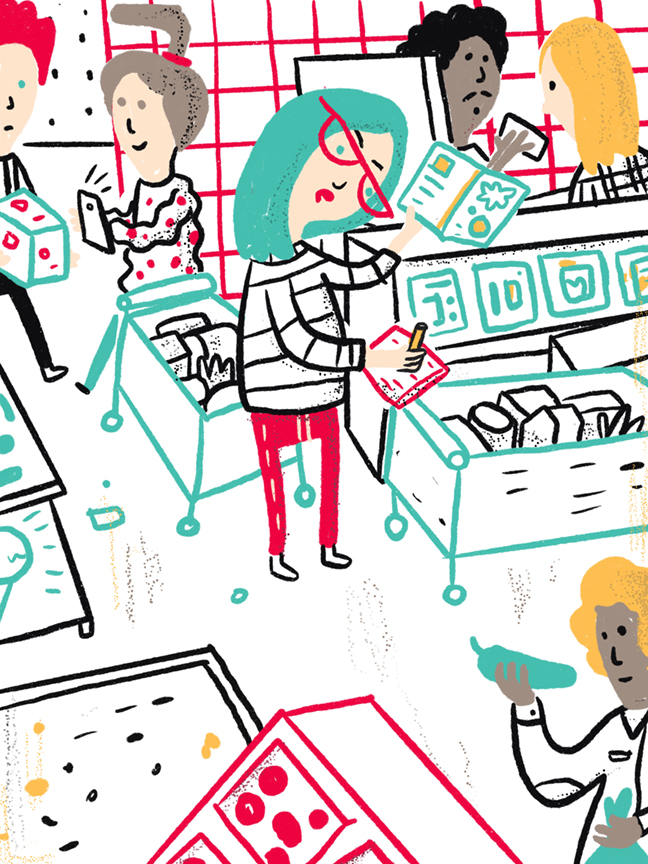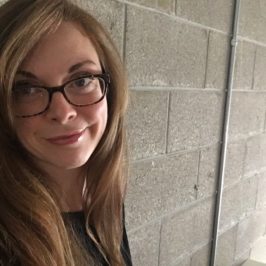Maybe you think of yourself as a bad researcher. You’re sure that, somewhere out there on the Internet, there’s the perfect source for your article, but you have no idea how to research.
Or maybe you don’t think of yourself as a researcher at all. Real researchers have academic credentials, government grants, and access to better libraries than you do.
The first step to doing good research is recognizing that you are already a researcher. The textbook The Craft of Research asserts that research isn’t for academics. All of us do research “whenever we gather information to answer a question that solves a problem.”

“Consider bringing some research opportunities home with you…” Illustration by Josh Quick
This definition applies to many research contexts. Scientists who want to cure cancer conduct randomized controlled trials to determine whether or not a promising new drug will work. A new parent who wants to exercise gathers information on jogging strollers before deciding which one to buy. Right now, you’re reading an article that offers insight into being a better researcher, which will help you solve problems with your writing.
The second step to doing good research is becoming a more creative and flexible researcher. This 5-part Creative Research series will teach you how to research throughout the writing process to identify and solve problems.
In this installment, I’ll address how to research before you ever put pen to paper or pixels to screen.
“Pay attention to what you pay attention to”
In 2013, the brilliant Amy Krouse Rosenthal offered this advice to aspiring creatives: “Pay attention to what you pay attention to.” It’s great life advice as well as a research strategy.
Paying attention to what you pay attention to can be a rich source of material. Lots of writers turn these observations into book-length progress (cooking your way through a famous French cookbook or preparing to box at Madison Square Garden). But even a few weeks of noticing your preferences and habits can generate new ideas.
Keep lists about yourself: every time you cry, the last words you say to your spouse every night, what you ate for dinner. Set an alarm on your phone and take a photo of whatever you’re doing at 11:11 AM for a month. After a few weeks or months, take a look at your lists and photos. You may realize that you’re constantly reading bedtime stories that feature kids going to sleep, or that you order tons of Indian takeout but never get table service. What questions do these observations open up for you? Those questions can be great starting places for personal essays and reported pieces.
Make every trip a research trip
The grocery store is full of research opportunities. All you have to do is read a product label. Why do hot dogs have warning labels? Can an epilator really cause birth defects? Why are beauty product warnings written in English and French, but cleaning product warnings written in English and Spanish?
A long wait in a checkout is also a great research opportunity. Start taking checkout magazine quizzes or horoscopes and analyze how they categorize and reduce people. Or ask why there are so many varieties of gum.
Consider bringing some research opportunities home with you, too. Purchase three of something (hot peppers, varieties of Cheez-its, spaghetti sauces) and conduct a taste test. You’ll be solving multiple problems at once—figuring out your household favorites while also generating new ideas for writing. You may end up with an essay about the language of conversation hearts, or a philosophical take on the reasons we seek out the “best” of any food.
Read broadly and often
If you’ve read any books about writing, you’ve probably Steven King’s On Writing, in which he reminds us that a writer “must do two things above all others: read a lot and write a lot.”
King hints that reading can be a mode of stylistic research: after reading a lot, you’ll develop new ideas for your own work. Reading can also be the start of new research questions, especially if you’re reading about previously-unfamiliar topics.
Not sure what to read? Get yourself on some email lists. The New York Times and NPR book newsletters are good places to start. Obama’s summer reading list has something for everyone. Don’t overlook sources like Oprah or Reese Witherspoon. Your goal should be to cast as wide a net as possible.
Need more to read? Get to your local library, which will have displays with new and interesting things to read as well as librarians to offer you more new and interesting things to read. Some libraries also offer personalized reading recommendations: type in books you like and you’ll get back a list with fresh ideas.
You needn’t limit yourself to books, of course. One of my favorite sources for reading, listening, and viewing recommendations is Austin Kleon’s weekly newsletter. (His book Keep Going, which I learned about from the newsletter, is where I read about AKR’s great quote, above.) Subscribing to weekly newsletters from a wide range of thinkers will keep you thinking broadly. Kleon shows up in my inbox once a week, as do Tim Carmody and Ann Friedman, while KJ Dell’Antonia surprises me at random intervals.
Once you’ve done all this research, you’ll need to start writing. How do you do strong research while still earning a reasonable hourly rate? I’ll cover that in Part II: Pick the Whole Orchard.
Want more tips on how to research in the meantime? Here are five steps for research success.

